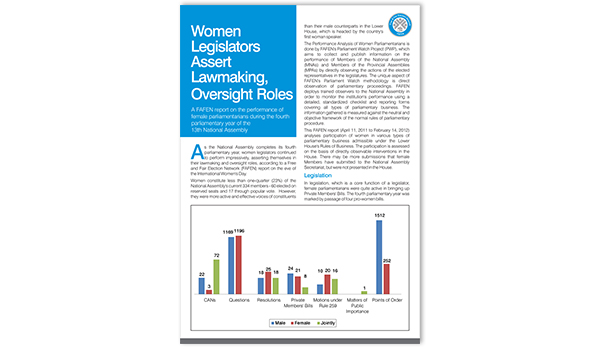 As the National Assembly completes its fourth parliamentary year, women legislators continued to perform impressively, asserting themselves in their lawmaking and oversight roles, according to a Free and Fair Election Network (FAFEN) report on the eve of the International Women’s Day.
As the National Assembly completes its fourth parliamentary year, women legislators continued to perform impressively, asserting themselves in their lawmaking and oversight roles, according to a Free and Fair Election Network (FAFEN) report on the eve of the International Women’s Day.
Women constitute less than one-quarter (23%) of the National Assembly’s current 334 members – 60 elected on reserved seats and 17 through popular vote. However, they were more active and effective voices of constituents than their male counterparts in the Lower House, which is headed by the country’s first woman speaker.
The Performance Analysis of Women Parliamentarians is done by FAFEN’s Parliament Watch Project (PWP), which aims to collect and publish information on the performance of Members of the National Assembly (MNAs) and Members of the Provincial Assemblies (MPAs) by directly observing the actions of the elected representatives in the legislatures. The unique aspect of
FAFEN’s Parliament Watch methodology is direct observation of parliamentary proceedings. FAFEN deploys trained observers to the National Assembly in order to monitor the institution’s performance using a detailed, standardized checklist and reporting forms covering all types of parliamentary business. The information gathered is measured against the neutral and objective framework of the normal rules of parliamentary procedure.
This FAFEN report (April 11, 2011 to February 14, 2012) analyses participation of women in various types of parliamentary business admissible under the Lower House’s Rules of Business. The participation is assessed on the basis of directly observable interventions in the House. There may be more submissions that female Members have submitted to the National Assembly Secretariat, but were not presented in the House.
For complete report click here








